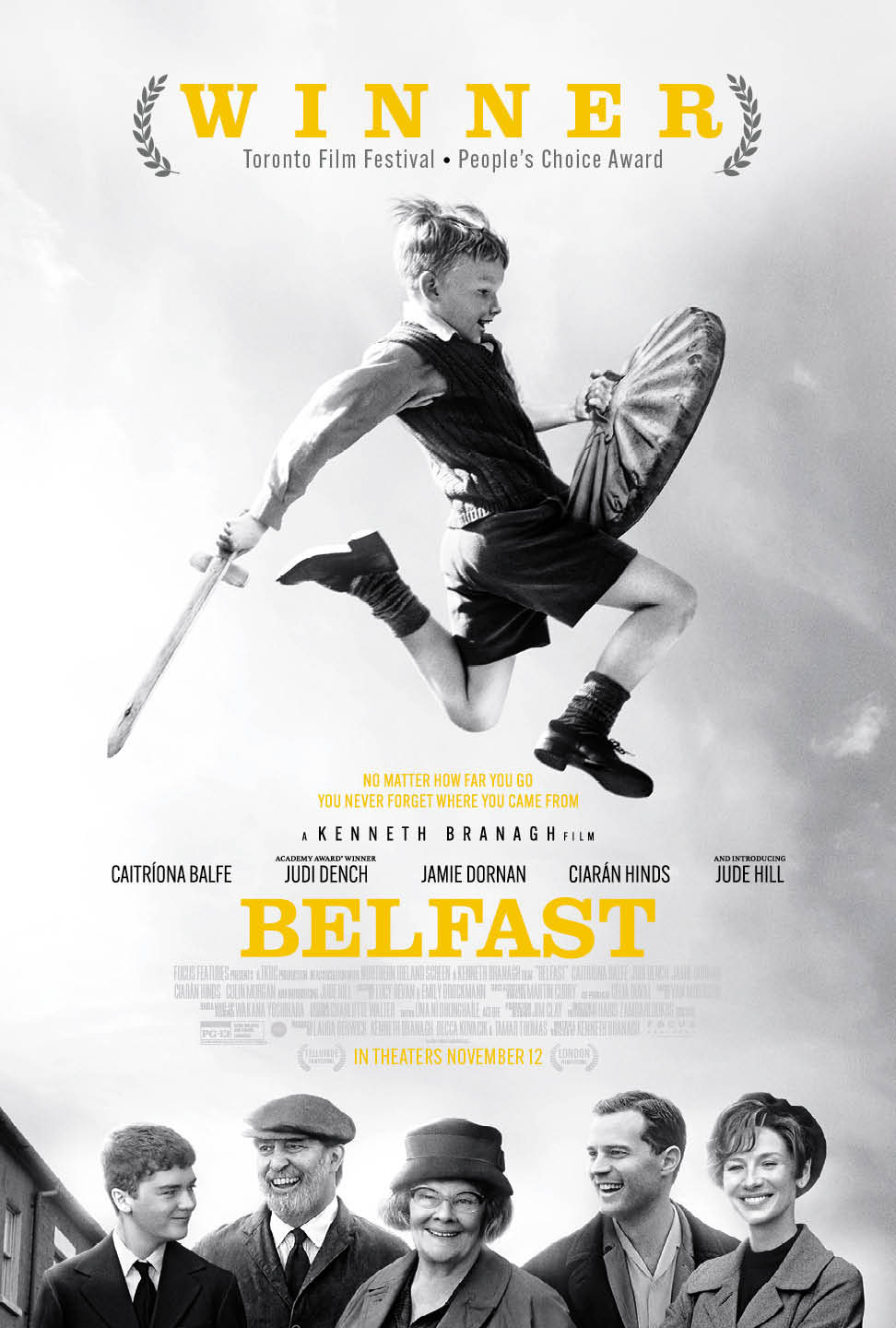BELFAST is directed by Kenneth Branagh. It stars Caitríona Balfe, Judi Dench, Jamie Dornan, Ciaran Hinds, Colin Morgan, and Jude Hill.
Based on director/writer Kenneth Branagh’s experienced growing up, BELFAST is the story of working-class people in Northern Ireland in 1969, in which the division of Protestants and Catholics has resulted in all-out wars in the streets, with riots and day-to-day uncertainty. Young Buddy’s father has to leave Ireland for work, with him often being looked after by his mother and grandparents, with the family finding solace in visiting the local cinema. The impressionable young boy tries to win over a girl in class while at the same time wanting to join a group, unaware of what their cause is. With the social turbulence, growing debts, and unstable working conditions, Buddy’s parents consider moving to get a new start and to get their children away from the chaos. Will they fix their lives amidst the instability, or will tragedy strike?
I’ve seen many productions starring/directed by Kenneth Branagh over the years. To mainstream audiences, he’s probably best known for his Shakespeare adaptations, the first THOR movie, and being a director/star in his adaptation of Agatha Christie’s MURDER ON THE ORIENT EXPRESS in which he portrayed Hercule Poirot, a role he’ll be reprising in this year’s DEATH ON THE NILE. Branagh has truly brought to life some of the greatest characters in fiction, typically either as a writer or director. But the promise that BELFAST would be a “dream project” of his sorts and semi-autobiographical definitely got my attention. While the final film is a bit uneven, there’s no denying Mr. Branagh is skilled at capturing the drama and the demons of his youth. It’s a hard-hitting film that does a great job taking its audience back in time, with many of its themes still relevant today.
Branagh has excellently casted BELFAST, with a solid crew of actors and actresses portraying these parts. No one feels out of place, and the depictions of these events, from more dramatic and hard-hitting moments to more light-hearted material, are all handled beautifully. Reactions from everyone are genuine, and this truly helps the viewer to get immersed in the turbulence of the day that was so shocking a reality from day to day with folks in their everyday lives divided by their religious differences. The true standout player in the film is young Jude Hill, who portrays the impressionable young Buddy. This character becomes lovable, and is instantly our window into the chaos that ensues throughout the film’s events. Here’s hoping this young man goes onto a promising film career.
The world building is equally effective. BELFAST starts with a shocking riot scene in a domestic neighborhood in Northern Ireland with people who’ll do their part to get rid of those of opposing religious beliefs by any means necessary, without regard for the safety or welfare of others. No other moment in the film hits quite as hard as this opening riot sequence, but there’s no denying it does its job and then some. It’s a shame Branagh opted to make a PG-13 film, as seeing these sequences with R-rated violence likely would’ve made them hit even closer to home. That’s not to say the scenes in this film aren’t effective, though.
The cinematography utilizes some effective techniques that further enhance the movie’s narrative and the impression it makes on the audience. Most of the film is in black and white, which instantly conveys a radically different mood than many films. Color is used to depict the world away from Belfast, as well as the films our characters see in the cinema. This literal “black-and-white world” technique with color emphasizing other fantastical inaccessible elements makes for some stirring visuals that’ll surely appeal to those who watch the film.
The movie isn’t quite perfect, though it’s a triumph in more ways than anything else. The major issue is that it sometimes struggles to juggle its characters and plot points. This slice-of-life approach isn’t a bad thing, but you will find yourself wondering what’s going on with certain persons and situations. The film is paced well, clocking in at under 100 minutes, though the juggling act is admittedly sometimes a struggle with the shorter running time. Nothing in the film ever quite rivals that opening riot sequence, and I do stand by my earlier remarks that an R rating might have done some dramatic wonders for the final product. Again though, these are minor flaws.
BELFAST is a great look into a bygone era from director Kenneth Branagh’s youth, with the grittiness and shock of a religious war that’s still being fought on the streets to this day. One of the pleasant surprise in cinema from 2021, I admittedly was a latecomer when it came to seeing this one, but I’m sure glad I got the opportunity. It’s a highly recommended film that brings together several choice elements, not the least of which being its experienced director/writer, and its young star. It’s well worth seeing and comes highly recommended!
BELFAST review

